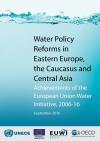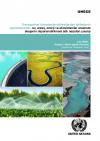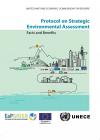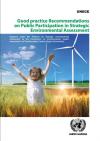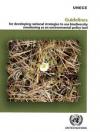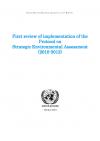Publications
Displaying Results 161 - 180 of 673
- English
The brochure highlights the main outcomes of the EU Water Initiative (EUWI) contributions in the EECCA countries. Section 2 highlights specific achievements at a country level
in the context of national policy dialogues facilitated by the OECD and UNECE. Section 3 focuses on water diplomacy, highlighting progress in the context of transboundary water management and the regional dimension of the
- English
This publication contains the results of the assessment of the water-food-energy-ecosystems nexus ─ essentially of intersectoral links, trade-offs and benefits ─ in the Alazani/Ganykh River Basin, shared by Azerbaijan and Georgia in the Caucasus, that has been carried out in the framework of the UNECE Water Convention’s programme of work for 2013–2015. The methodology employed was developed
- English
- English
- English
The purpose of this report is to provide an overview of implementation of the river basin planning principle in the countries of Eastern Europe, the Caucasus and Central Asia. It is a follow-up to a benchmarking study by UNECE and OECD from early 2014, where the overall status with regard to implementation of the IWRM principles was described. With just two years passed since the previous
- English
Good Practice Recommendations on Public Participation in Strategic Environmental Assessment available in English,
- Pусский
ECE/CEP/176
- English
Available in English and in Russian (not laid out). (ECE/CEP/176, 44 pp.)
This publication contains guidelines to help make biodiversity monitoring a practical tool for environmental policy for countries of Eastern Europe, the Caucasus, Central Asia and South-Eastern Europe. The guidelines offer advice on how to:
Develop plans and strategies for conservation and sustainable use of
- English
The Strategic Framework for Adaptation to Climate Change in the Neman River Basin has been developed under the international project “River Basin Management and Climate Change Adaptation in the Neman River Basin” . The Project was implemented between 2012 and 2014 under the Program of the United Nations Economic Commission for Europe (UNECE) and with support from the international Environment and
- Pусский
The Strategic Framework for Adaptation to Climate Change in the Neman River Basin has been developed under the international project “River Basin Management and Climate Change Adaptation in the Neman River Basin” . The Project was implemented between 2012 and 2014 under the Program of the United Nations Economic Commission for Europe (UNECE) and with support from the international Environment and
- Français
Coordination between the water, energy, food and environment sectors is fraught with difficulties even at the national level, but the complexity increases substantially in transboundary basins where the impacts spread from one country to another. The “nexus approach” to managing interlinked resources has emerged as a way to enhance water, energy and food security by increasing efficiency,
- English
Coordination between the water, energy, food and environment sectors is fraught with difficulties even at the national level, but the complexity increases substantially in transboundary basins where the impacts spread from one country to another. The “nexus approach” to managing interlinked resources has emerged as a way to enhance water, energy and food security by
- Pусский
Coordination between the water, energy, food and environment sectors is fraught with difficulties even at the national level, but the complexity increases substantially in transboundary basins where the impacts spread from one country to another. The “nexus approach” to managing interlinked resources has emerged as a way to enhance water, energy and food security by increasing efficiency,
- English
This report was prepared as part of the National Dialogue on Water Policy and Integrated Water Resources Management in Kyrgyzstan with support from the UNECE. The basis for preparation of report was the request of the Government of the Kyrgyz Republic to implement a set of measures aimed at improving irrigation technologies and introduction of effective methods of crop irrigation, including
- English
The National Policy Dialogues is the main operational instrument of the EU Water Initiative (EUWI), an international partnership that aims to contribute to the achievement of the water related Millennium Development Goals. UNECE is the strategic partner supporting the policy dialogue process on IWRM. The OECD is the strategic partner for water supply and sanitation.
- Pусский
Transboundary water cooperation is necessary to manage shared waters in an integrated and sustainable way. It has the potential to generate many significant benefits for cooperating countries, such as accelerated economic growth, improved human well-being, enhanced environmental sustainability and increased political stability. Nevertheless, many challenges can prevent or delay countries from
- Français
Transboundary water cooperation is necessary to manage shared waters in an integrated and sustainable way. It has the potential to generate many significant benefits for cooperating countries, such as accelerated economic growth, improved human well-being, enhanced environmental sustainability and increased political stability. Nevertheless, many challenges can prevent or delay countries from
- Español
La cooperación en materia de aguas transfronterizas es necesaria para gestionar las aguas compartidas de manera integrada y sostenible. Tiene el potencial de generar numerosos beneficios importantes para los países que cooperan, tales como la aceleración del crecimiento económico, la mejora del bienestar humano, la mejora de la sostenibilidad ambiental y el aumento de la estabilidad política.
- English
Transboundary water cooperation is necessary to manage shared waters in an integrated and sustainable way. It has the potential to generate many significant benefits for cooperating countries, such as accelerated economic growth, improved human well-being, enhanced environmental sustainability and increased political stability. Nevertheless, many challenges can prevent or delay countries from
- English


